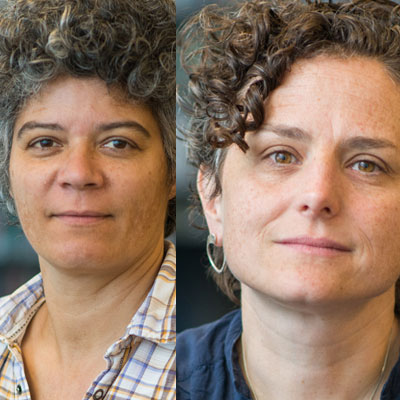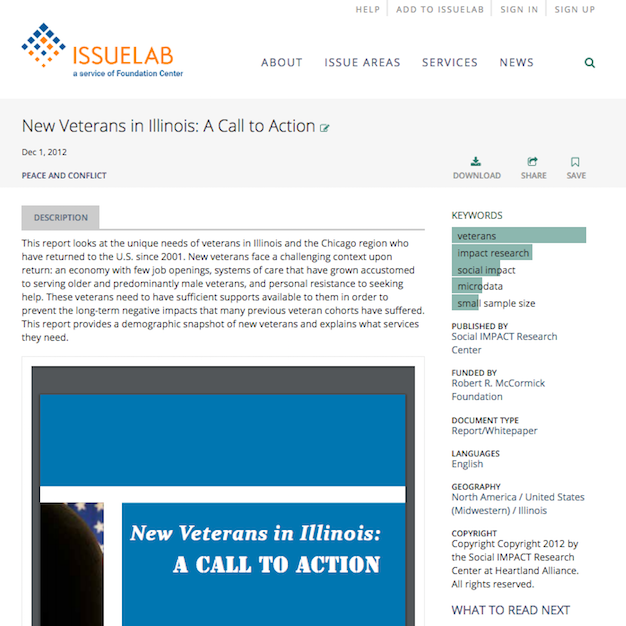
Lisa Brooks (L) and Gabriela Fitz (R)
At Nonprofit Marketing Guide, we are always asking you to share your experiences with our community so we can all learn from one another – mistakes and all. Today we hear from Gabriela Fitz and Lisa Brooks of IssueLab about the importance of sharing. ~Kristina
Guest Post By Gabriela Fitz and Lisa Brooks
Into the life of every nonprofit communicator comes a certain amount of pitching, like asking an editor or blogger to take an op-ed piece or soliciting a reporter to cover your news conference. In addition, many of us spend our time managing the direct relationships that we have painstakingly built up on email, web, and social media platforms with our own direct audiences.
But alongside that important work – and the thoughtfulness of a good communications strategy – is the need for the social sector to more actively adopt an open knowledge sharing approach.
Every foundation, nonprofit or research institution, whether it is providing services or shaping policy, is producing knowledge. That knowledge is not just a by-product of your work for the common good—it’s an important part of what you do and it deserves attention in its own right (Of course it also tells audiences a lot about your organization’s values, impact, and story).
One of our favorite stories about why we created IssueLab, the Foundation Center’s platform for gathering and sharing what the social sector is collectively learning about social problems and their solutions, involves the Heartland Alliance.
The Chicago-based nonprofit hired us to help develop their Social Impact Center online library of policy and advocacy research. Mainly they wanted to help their site users and staff to find and share their research. But in doing so, they also made their research broadly accessible via issuelab.org.
Through work we later did on a couple of special collections for foundation clients that we witnessed, unbeknownst to Heartland, how staff at several foundations were now accessing Heartland’s research on veterans and poverty to inform their institutions’ plans for program and policy development.
This was exactly the full circle we envisioned in building an open, collective, and distributed system for sharing social sector research. By openly sharing their knowledge through one part of the system, Heartland Institute’s lessons learned were being accessed in another part of the system, by audiences unknown and unforeseen.
What do we mean by knowledge sharing?
After 10 years we’ve learned a bit about facilitating the collection, indexing, and sharing of valuable social sector knowledge. On the collection and indexing side, IssueLab has collected more than 20,000 resources from 7000+ organizations worldwide, covering 38 different issue areas. We index each piece of research on 15 different fields, from a basic description and author name to publication date, funding institution, and geographic focus. This metadata then allows us to provide filtered search functionality, issue area indices, and recommendations on “what to read next.”
Gathering these resources relies on many people to take the small action of uploading and sharing their research to open repositories like IssueLab. On IssueLab, creating a free account is a precursor to sharing — after that we ask authors to fill out some basic information and then IssueLab staff reviews and fully indexes each piece of research that we host. IssueLab data is then made available through a free API to data partners and other Foundation Center properties as well as through WorldCat, the world’s largest network of library content and services.
Here’s the real reason the Heartland example is a favorite story: we have no idea whether Heartland directly benefited from sharing its research via IssueLab— that would be like asking if a professor directly benefits when someone checks her book out of the library. But we do know organizations who fund work in this area and who are dedicating more and more dollars to this issue can now base their decisions on the insights and evidence of nonprofits, like Heartland.
And after all, we produce research and capture lessons learned so we can learn from our peers and our past and more effectively serve the people who rely on these programs and dollars.
We know and believe that knowledge sharing is neither a channel nor a pitch, it is an approach – and maybe even an ethos – to telling our stories. We hope sharing your research more openly can fit in with your organization’s larger outreach strategy, as well.
Lisa Brooks is director of knowledge-management systems at Foundation Center and Gabriela Fitz is director of knowledge-management initiatives at Foundation Center. Both co-founded IssueLab together.






